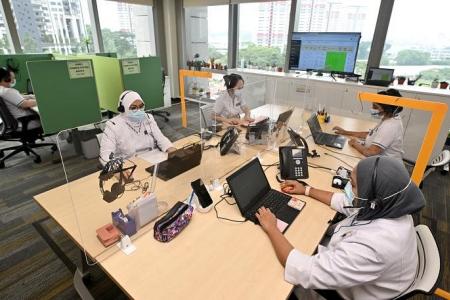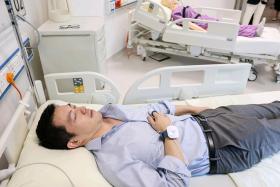Virtual wards among steps to anchor healthcare in community
In January, when Mr Paul Osmond Thomas George’s heart disease caused him to develop increased fluid build-up in his body, his doctor prescribed a five-day course of intravenous diuretics to be given in hospital to clear the excess fluid.
“I told her (his doctor) that there’s no way that I will want to stay in the hospital,” the 46-year-old said. “I had a hospital stay of about six months (in 2022)... It was very depressing.”
Mr George, who retired early a few years ago, had to be admitted for a bacterial infection at a time when visitors were first not allowed and then restricted due to pandemic curbs. His wife and two children could not see him during the first month of his stay.
When he was referred to the virtual ward pilot programme at Sengkang General Hospital for his latest ailment, he said yes.
During the home stay, a doctor examined him via Zoom every morning, and a nurse came by twice a day to administer the treatment and check on him. He was discharged after a six-day stay.
“I had my ice kachang... You have the comfort of your home and can do whatever you want,” he said.
A virtual ward will become an option in public healthcare institutions here from April, and patients will not pay more for Mobile Inpatient Care at Home (MIC@Home) than they do for acute inpatient care in a public hospital, said Health Minister Ong Ye Kung during the debate on his ministry’s budget on March 6. It will be supported by MediShield Life and MediSave subsidies.
Virtual wards will aid in the shift of healthcare to the community, to help reduce the need for so many inpatient beds, he said.
They are part of a broad swathe of measures aimed at meeting growing healthcare demand from a rapidly ageing population, and managing rising healthcare costs.
Public health specialist Jeremy Lim said: “Conceptually, patients will want to be at home or in the community if they can, given how hard it is to get a good rest in the acute hospital setting, the risk of hospital-acquired infections, and the hassle relatives experience in visiting.
“That said, being in the community is not friction-free either, as meals, toileting, et cetera, will need to be taken care of. Funding to ensure patients and their families are not financially worse off for doing the right thing by moving out into the community would be an important issue to address.”
Get The New Paper on your phone with the free TNP app. Download from the Apple App Store or Google Play Store now


